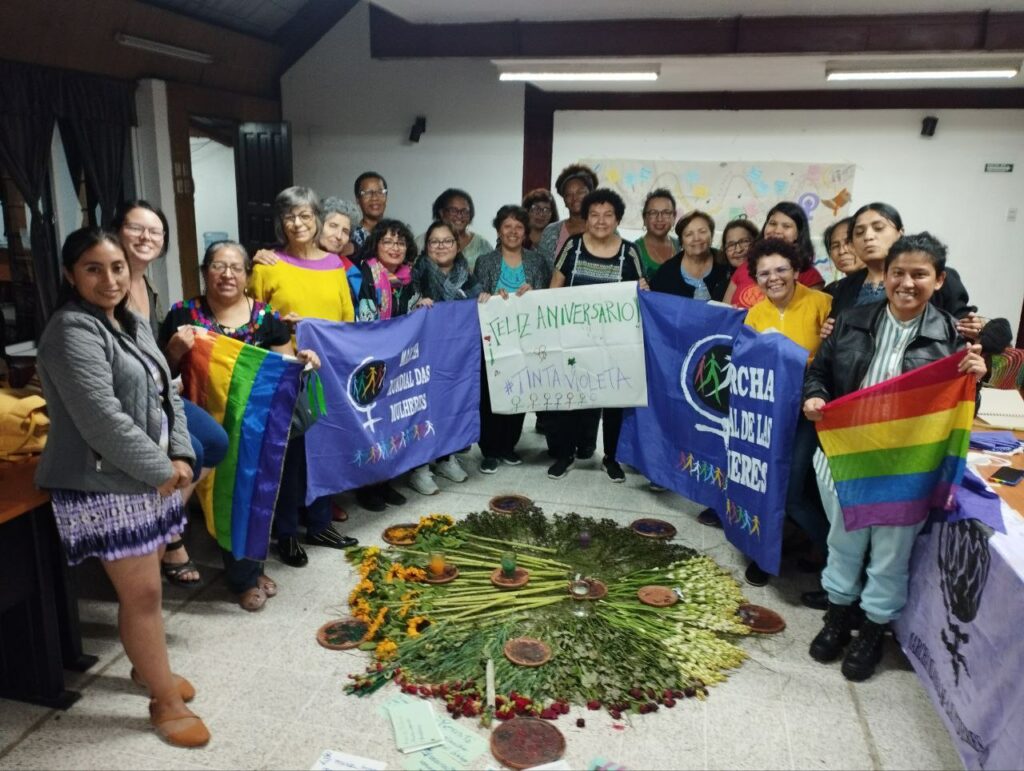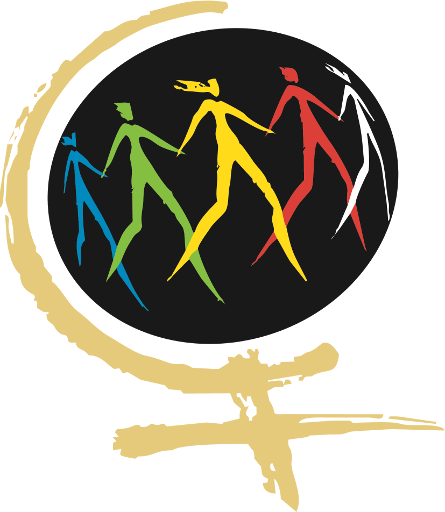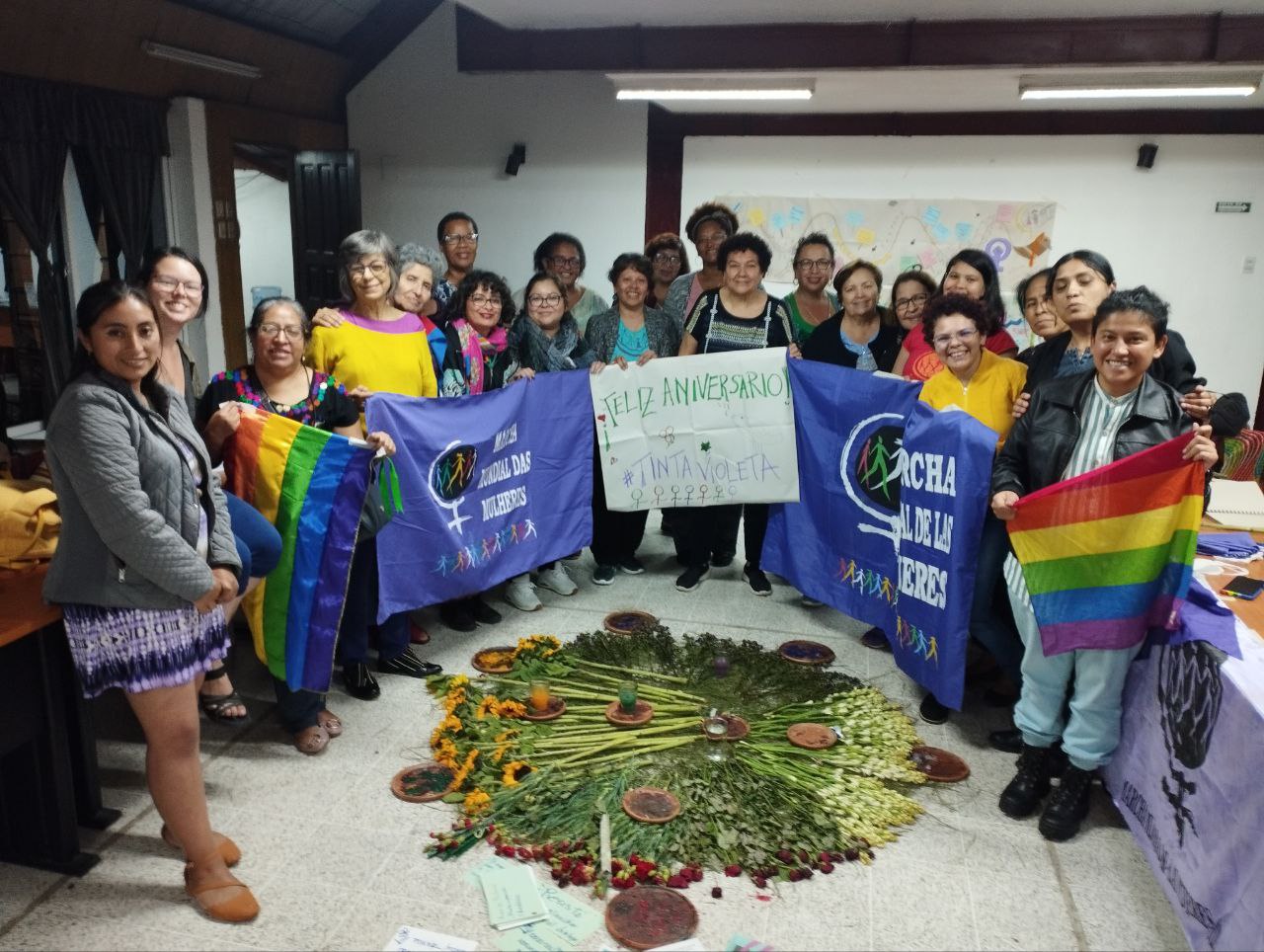
The National Coordinations of the World March of Women of the Americas met in Guatemala City for their first face-to-face regional meeting after the pandemic began. During October 15, 16 and 17, the militants of the Americas updated their reflections and political debates based on the challenges of the current situation.
From these reflections and debates, we will be able to continue organizing our struggles and resistances as women, from diverse territorial organizations in the Americas, in the face of the multiple crises caused by neoliberal, racist and patriarchal capitalism.
The NCBs from Guatemala, Mexico, Peru and Macronorte Peru, Argentina, Quebec, Cuba, Dominican Republic, Brazil, United States, Chile, Honduras, Paraguay, El Salvador and Bolivia met.
We began the meeting with a welcome and mystique shared by our Guatemalan companions, based on the cosmovisions of the Xinca and Kaqchiquel peoples. Different from how we do it in the virtual environment, the mystique was also a moment of face to face sharing. Sisters from other countries were even able to participate in the collective construction of the ornamentation of the mística. At this moment, the compas from Quebec also shared a small symbol representing the struggle of working women, in the shape of a brooch made of small red T-shirts.
In addition, during the 3 days of the meeting we shared reports and evaluated processes that we are involved in or are responsible for. We held a special debate on the topic of feminist training, sharing the accumulations and learnings from the processes of the Berta Cáceres Feminist School WMW Americas in connection with the experience of IFOS International and also IFOS facilitators. Also communication and issues related to the international dynamics of the WMW were discussed.
In one of the evenings we also participated in a special moment prepared by the comrades from Guatemala to listen about their experiences of struggles as women from the Kaqchikel, Quiche, Xinca and Mestiza peoples.
Among the main points highlighted by the militants are the disputes of power and the democracies of our countries, the offensive of the imperialist and conservative powers, which try to stop the advances of the popular resistance of women and peoples. In this context, we highlight our resistance in the territories against transnational corporations, violence and political persecution from the extreme right, and we continue defending our alternatives and proposals to transform the world, putting life at the center.
Brief summary of the challenges of the context and our commitments as WMW throughout the continent
From the context reports sent by the National Coordinations, the delegates were able to analyze the trends, context challenges and our commitments as WMW throughout the continent.
As trends of the context, we highlight:
– Offensive of the global Right and the consolidation of the factical powers in the world (Capitalist, patriarchal, racist and classist) example of left-wing presidents who end up being dominated by this system.
– A neo-fascist international is being installed and is becoming normalized throughout the world.
– Disputes over democracies
– Ideological domination that subordinates us to its interests (education and media).
– Criminal alliance of transnational corporations with governments that impose the management of territories.
– Fragmentation of the left which strengthens the right, while confronting or weakening the left.
– Strategy of division of the communities and territories, in resistance, leaders in the territories are co-opted, weakening organizations.
– Hate campaigns with fundamentalism and regression in the rights of women, LGTB communities, peoples; in schools, teachers, media, with the generation of false information, of what feminist organizations are, stating that they are against the family.
– Labor exploitation, racialization and precariousness of work, uberization. With emphasis on women’s unpaid work.
– Racism, colonialism and discrimination in the territories.
– The advance of pharmaceutical companies over the control of women’s bodies (during the pandemic, there were no contraceptive methods, which generated the obligatory nature of maternity; also the medicalization of bodies, for example).
– Political violence to reduce the political subjects, installed with the racism of the subjects fighting in the territories, hetero-colonial violence that maintains the status, while the destruction of the common goods to maintain the privileges of the oligarchies.
– Criminalization of struggles
– The role of corporate power and instances such as the UN, OAS, World Bank, in the co-optation of our struggles and knowledge.
In view of this, we identify our main challenges
Internal strengthening of the WMW to be strong in the streets.
– Strengthening the capacity for territorial action, influencing the territory with political positioning.
– Strengthening the political positioning of the WMW (our practice)
– Training as an element of formation, articulation with other movements, creating other women.
– To build together with alliances and resistances to the current forms of fascism and reactionary right wing, weakening of democracies and to dispute our proposals.
– Positioning of the feminist and popular economy.
– Strengthening of political subjects of transformation against transnational power, food justice, feminist economy.
– Strengthening our communication as a region, starting with the Bulletin of the Americas, spaces for exchange, the consolidation of a collective of communicators in the region to also contribute at the international level, continue strengthening Capire and reflect more deeply on our strategies of feminist, popular, anti-racist and anti-capitalist communication.
Soon we will share with the NCBs of the Americas the complete report of the meeting.
We resist to live, we march to transform!

